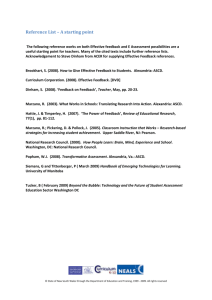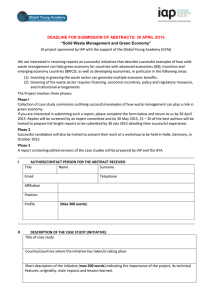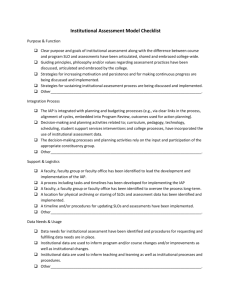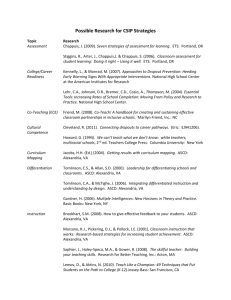School of Teaching and Learning EDCI 613 Teacher Leader
advertisement
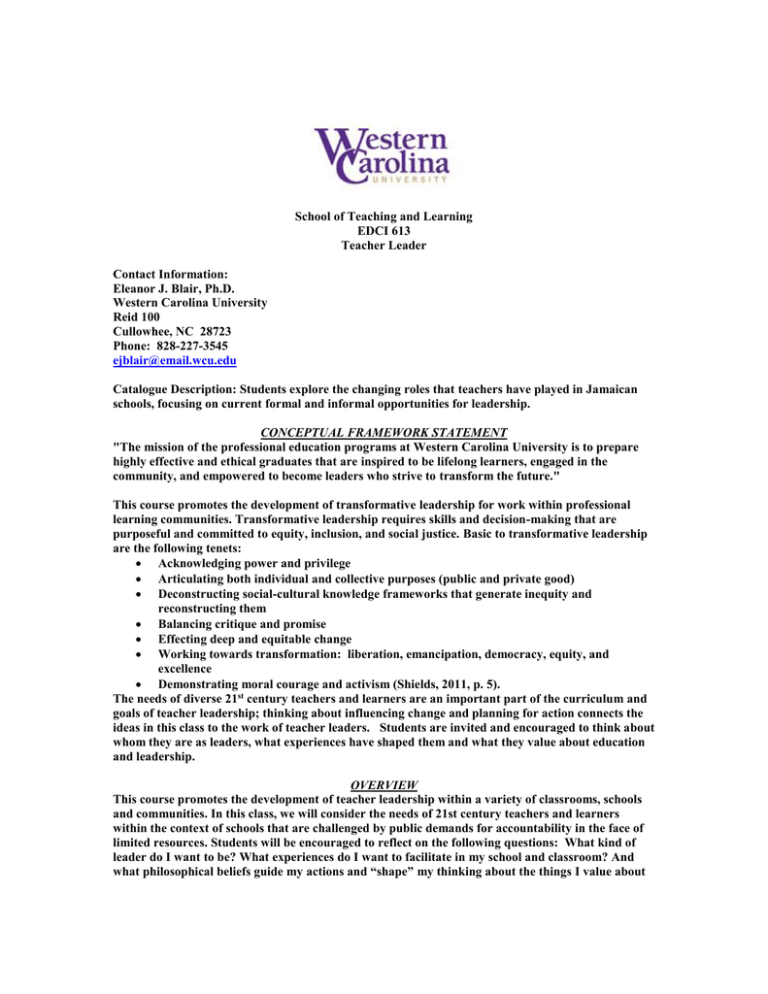
School of Teaching and Learning EDCI 613 Teacher Leader Contact Information: Eleanor J. Blair, Ph.D. Western Carolina University Reid 100 Cullowhee, NC 28723 Phone: 828-227-3545 ejblair@email.wcu.edu Catalogue Description: Students explore the changing roles that teachers have played in Jamaican schools, focusing on current formal and informal opportunities for leadership. CONCEPTUAL FRAMEWORK STATEMENT "The mission of the professional education programs at Western Carolina University is to prepare highly effective and ethical graduates that are inspired to be lifelong learners, engaged in the community, and empowered to become leaders who strive to transform the future." This course promotes the development of transformative leadership for work within professional learning communities. Transformative leadership requires skills and decision-making that are purposeful and committed to equity, inclusion, and social justice. Basic to transformative leadership are the following tenets: Acknowledging power and privilege Articulating both individual and collective purposes (public and private good) Deconstructing social-cultural knowledge frameworks that generate inequity and reconstructing them Balancing critique and promise Effecting deep and equitable change Working towards transformation: liberation, emancipation, democracy, equity, and excellence Demonstrating moral courage and activism (Shields, 2011, p. 5). The needs of diverse 21st century teachers and learners are an important part of the curriculum and goals of teacher leadership; thinking about influencing change and planning for action connects the ideas in this class to the work of teacher leaders. Students are invited and encouraged to think about whom they are as leaders, what experiences have shaped them and what they value about education and leadership. OVERVIEW This course promotes the development of teacher leadership within a variety of classrooms, schools and communities. In this class, we will consider the needs of 21st century teachers and learners within the context of schools that are challenged by public demands for accountability in the face of limited resources. Students will be encouraged to reflect on the following questions: What kind of leader do I want to be? What experiences do I want to facilitate in my school and classroom? And what philosophical beliefs guide my actions and “shape” my thinking about the things I value about education and leadership? And finally, what professional contributions do I want to make in my own career? Teacher leadership, in its current form, is an outcome of the movement to improve student achievement; however, ultimately, teacher leadership has the potential to profoundly impact the ways that we think and talk about teacher’s work. Globally, teachers began to assume more visible leadership roles with the advent of standards-based school reform in the 1980s. As the quality of the teacher workforce began to be more scrutinized and held to more stringent standards, teacher leadership began to be viewed by many as one area in which teachers themselves could be empowered to address school reform in ways that contribute not only to student achievement, but to the quality of the educational experience of students, teachers, and other participants in the teaching/learning process. This course will examine teacher leadership as it currently exists in the Jamaican educational system. It will be discussed as a potentially powerful mechanism for the improvement of teaching and learning in Jamaican schools. Strategies will be discussed that place teacher leaders [form teachers, lead teachers, master teachers, senior teachers] in the forefront of efforts to improve instruction, develop professionalism in themselves, and nurture it in their colleagues. As a phenomenon that has grown in importance over the last two decades, teacher leadership is a “sleeping giant” that will increasingly impact the ways in which all teachers try to make sense of new and expanding work roles. We will examine these new roles and consider how teacher leaders contribute to teachers’ understanding of them. We will look at teaching from an historical point of view and ask how cultural factors have influenced teachers’ work. We will also look at teaching within the larger organizational framework of schooling where teachers serve as political actors who potentially wield or relinquish power within the organization. Like the act of teaching, teacher leadership must respond to the context in which it occurs. Despite the attention placed on mandates from the Ministry of Education and Culture (MOEC), and the often highly prescriptive nature of the MOEC responses to educational policies, the work done by teachers varies greatly from region to region, school to school, and from classroom to classroom. Therefore, in this course, we will continually refer to our own experiences as educators to consider issues of practice and question how conceptions of leadership may influence the quality of teaching and learning in Jamaican schools. DIVERSITY STATEMENT The professional education unit at Western Carolina University defines diversity broadly to include exceptionalities, race, ethnicity, culture, religious background, gender, linguistic differences, socioeconomic level, and any of the other ways our society defines human and group differences, including age, geography, sexual orientation and national origin. Students in this class will explore the role of the educational leader in providing leadership in school to create climates and instructional strategies to meet the needs of diverse teachers and learners. The composition of our student population deeply influences the educational experiences that they receive at WCU. Students are both recipients and providers of the teaching/learning that takes place in this course, and therefore, I have a vital interest in the experience that WE create in this classroom. Learning in an environment populated with different perspectives helps students to confront ideas and viewpoints that vary from their own, and thus, to think more vigorously and imaginatively about the issues. The educational benefits of student diversity include the discovery that there is a broad range of viewpoints and experiences within any given community—as well as learning that certain imagined differences often turn out to be not so different from one’s own perspective. The quality of our interaction depends upon each of us respecting and valuing our differences and being open to the “aha!” moments that we can create as a group. In this course, students will explore the role of the educational leader in creating an organizational culture and climate that is responsive to the needs of diverse individuals. TEXTBOOKS AND OTHER REQUIRED MATERIALS Charlotte Danielson. (2006). Teacher Leadership that Strengthens Professional Practice. ASCD. ISBN# 978-1-4166-0271-2 Linda Lambert. (2003). Leadership Capacity Building for Lasting School Improvement. ASCD. ISBN#0871207788 Carolyn M. Shields. (2011). Transformative Leadership: A Reader. New York: Peter Lang Publishing. ISBN# 978-1-4331-1309-3 A collection of case studies will be used in this class. They are available on the Blackboard link for this class and should be downloaded and/or printed out by each student. In addition, you are responsible for using APA style in all submitted papers prepared for this and other graduate classes. Writing resources for all students (including information on research documentation) are available at the following link for the WCU Writing Center: http://www.wcu.edu/academics/campus-academic-resources/writing-and-learning-commonswalc/index.asp COURSE OBJECTIVES This course addresses Standard I: Teacher Leadership from the NC Standards for Graduate Teacher Candidates: Teacher leaders assume the roles and responsibilities of collaborative leaders in schools and communities. Teachers demonstrate leadership in their classrooms, schools and professional organizations; they advocate for students and effective educational practices and policies; and they are role models for ethical leadership. Teacher leaders will know and be able to: Demonstrate effective ongoing communication, collaboration, and team-building among colleagues. Facilitate mentoring and coaching with novice teachers. Set goals and establish priorities while promoting educational initiatives that positively affect student learning. Participate in professional learning communities. Students will demonstrate their mastery of this standard through the completion of the Influencing Action Plan (IAP) required for this course. Teacher leadership is an influencing activity. Many people want to influence others, to have a positive influence on the organization or grade level or department, to create a change for improvement - but they do not think about how that change could be possible. They recognize a problem, envision a needed change, but do not develop a plan or steps for bringing about that change. The IAP is a culminating experience for MAED students in the second half of their program of study. The IAP is an opportunity for students acting as Teacher Leaders to apply the knowledge and skills acquired in the program to the exploration of a relevant school issue and/or problem. The North Carolina Standards for Graduate Teacher Candidates identify a broad standard related to Teacher Leadership (Standard 1). The IAP is designed to primarily address this standard. The process of developing an IAP requires each student to integrate knowledge in each of the standards with an understanding of “the knowledge, skills and dispositions demonstrated by teachers who positively impact student learning by influencing adults, formally and informally, beyond individual classrooms” (Teacher Leadership Skills Framework, Center for Strengthening the Teaching Profession (CSTP), 2009). More specifically, candidates have already been exposed to the initial licensure standards, the North Carolina Professional Teaching Standards, in the area of Teacher Leadership. This includes advocacy as part of teacher leadership. One of the elements for Standard 1: Teacher Leadership is: Teachers advocate for schools and students. Teachers advocate for positive change in policies and practices affecting student learning. They participate in the implementation of initiatives to improve the education of students. Advocate for positive change in policies and practices affecting student learning. Participate in the implementation of initiatives to improve education Candidates are asked, “How can I be an advocate? What can I do to make a difference?” The energy put into formulating a plan that includes a rationale and a step by step process for creating change can result in the greater influence needed to see change happen. Creating an Influencing Action Plan can result in effective leadership and outcomes that benefit students and/or the organization. POLICY ON ACADEMIC HONESTY Western Carolina University, a community of scholarship, is also a community of honor. Faculty, staff, administrators, and students work together to achieve the highest standards of honesty and integrity. Academic dishonesty is a serious offense at WCU because it threatens the quality of scholarship and defrauds those who depend on knowledge and integrity. Academic dishonesty includes the following: A. Cheating. Intentionally using or attempting to use unauthorized materials, information, or study aids in any academic exercise. B. Fabrication. Intentional falsification or invention of information or citation in an academic exercise. C. Plagiarism. Intentionally or knowingly representing the words or ideas of someone else as one’s own in an academic exercise. D. Facilitation of Academic Dishonesty. Intentionally or knowingly helping or attempting to help someone else to commit an act of academic dishonesty, such as knowingly allowing another to copy information during an examination or other academic exercise. The full University Academic Integrity Policy is located at: http://catalog.wcu.edu/content.php?catoid=29&navoid=560#honestypolicy CODE OF STUDENT CONDUCT Western Carolina University deems sexual harassment to include conduct constituting sexual harassment under Title VII of the Civil Rights Act of 1964 and Title IX of the Education Amendments of 1972. The University Code of Student Conduct Policy is located at: http://www.wcu.edu/student-life/division-of-studentaffairs/departments/student-community-ethics/code-of-student-conduct.asp ANY STUDENT IN THIS CLASS WHO IS FOUND GUILTY OF ACADEMIC DISHONESTY WILL RECEIVE A GRADE OF “0” ON THE ASSIGNMENT IN QUESTION, AND THE FINAL GRADE FOR THAT STUDENT WILL BE NO HIGHER THAN A “C.” DEPENDING ON THE SEVERITY OF THE OFFENSE, A STUDENT MAY FAIL THE CLASS DUE TO ACADEMIC DISHONESTY. EVALUATION PROCEDURES 1. Plagiarism Self-Test: Students will complete this quiz prior to beginning the class and submit the signed Plagiarism Certificate to the professor on the first day of class. (25 pts). http://www.wcu.edu/academics/campus-academic-resources/writingand-learning-commons-walc/faculty-toolbox/tools-for-writingassignments/plagiarism-resources/the-plagiarism-self-test/ 2. Attendance, Participation, Preparation, and Attitude (APPA): (10 classes x 10 pts for each class/100 pts)….Points will be adjusted if the class meets more than 10 times. Students arriving late for class will have their points adjusted accordingly. 3. IAP Prep/Interview/Reflection Assignment (100 points). Each student will conduct interviews with a current acting school principal, a community and/or business leader and a special education teacher. Guidelines will be provided. These interviews will provide a foundation for beginning work on the IAP. The submission for this assignment will be summaries of the three interviews and a final reflection on what you learned. 4. School Improvement Plans/Review of Instructional Materials (50 points). Each student will locate the school improvement plan for their school and as part of the review of that plan assist in the selection and/or review of instructional materials in a discipline or grade level other than the one at which you have the most experience. Guidelines will be provided. 5. Reflection Journal Entries: Students will be provided prompts to respond to in reflective journal entries (6 Entries/25 points/ 150 points). 6. Case Study Questions: (6 cases/5 pts each/30 total points). 7. Final Exam: Each student is expected to read both books and take a final exam over the main ideas from the texts. (100 pts). 8. Final IAP Presentation Discussion: 25 pts. Each student will “present” their final IAP through a designated discussion forum. Guidelines will be provided. In addition to the initial presentation, each student is expected to participate in the discussion by responding with questions and comments to at least two other presentations. 9. Each student will be asked to examine in-depth a Teacher Leadership Issue in Jamaica and develop an Influencing Action Plan. (100 pts). Rationale for the IAP: Teacher leadership is an influencing activity. Many people want to influence others, to have a positive influence on the organization or grade level or department, to create a change for improvement - but they do not think about how that change could be possible. They recognize a problem, envision a needed change, but do not develop a plan or steps for bringing about that change. The IAP is an important experience for graduate students. The IAP is an opportunity for students acting as Teacher Leaders to apply the knowledge and skills acquired in the program to the exploration of a relevant school issue and/or problem. Students may earn a total of 680 pts. Grades will be based on the following percentages of the total possible points: 90 – 100% = A 80 – 89% = B 70 – 79% = C Below 70 % is a Failing Grade SELECTED BIBLIOGRAPHY Capacity Building Harris, A. & Lambert, L. (2003). Building leadership capacity for school improvement. Berkshire, England: Open University Press. Lambert, L. (2003). Leadership capacity building for lasting school achievement. Alexandria, VA: ASCD. Senge, P., Cambron-McCabe, N., Lucas, T., Smith, B., Dutton, J., & Kleiner, A. (2000). Schools that learn: A Fifth Discipline fieldbook for educators, parents, and everyone who cares about education. New York: Doubleday. Distributed Leadership Chrispeels, J. H. (Ed.). 2004). Learning to lead together: The promise and challenge of sharing leadership. Thousand Oaks, CA: Sage. Leadership Elmore, R. F. (2001). Building a new structure for school leadership. Washington, DC: The Albert Shanker Institute. Kouzes, J. & Posner, B. (1995). The leadership challenge: How to get extraordinary things done in organizations. San Francisco: Jossey-Bass. Marzano, R. L., Waters, T., & McNulty, B. A. (2005). School leadership that works: From research to results. Alexandria, VA: ASCD. Professional Development Drago-Severson, E. (2004). Helping teachers learn: Principal leadership for adult growth and development. Thousand Oaks, CA: Corwin. Sparks, D. & Hirsh, S. (1997). A new vision for staff development. Alexandria,VA: Association for Supervision and Curriculum Development. Professional Learning Communities DuFour, R. (2002). The learning-centered principal. Educational Leadership, 59(8), 12-15. DuFour, R., & Eaker, R. (1998). Professional learning communities at work: Best practices for enhancing student achievement. Alexandria: ASCD. DuFour, R., Eaker, R., & DuFour, R. (Eds.). (2005). On common ground: The power of professional learning communities. Bloomington, IN: National Educational Service. Roberts, S. M., & Pruitt, E. Z. (2003). Schools as professional learning communities. Thousand Oaks, CA: Corwin Press. Smith, S. S., & Scott, J. J. (1990) The collaborative school: A work environment for effective instruction. Reston, VA: NASSP. School Improvement Reeves, D. B. (2006).The learning leader: How to focus school improvement for better results. Alexandria, VA: ASCD. Marzano, R. J. (2003). What works in schools: Translating research into action. Alexandria, VA: ASCD. Reeves, D. B. (2004). Accountability for learning: How teachers and school leaders can take charge. Alexandria, VA: ASCD. Schmoker, M. (1999). Results: The key to continuous school improvement (2nd Ed.) Alexandria, VA.: Association for Supervision and Curriculum Development. Schmoker, M. (2001). The results fieldbook: Practical strategies from dramatically improved schools. Alexandria, VA: Association for Supervision and Curriculum Development. Teacher Leadership Collay, M. (2011). Everyday teacher leadership: Taking action where you are. San Francisco: Jossey-Bass. Gabriel, J. G. (2005). How to thrive as a teacher leader. Alexandria, VA: ASCD. Katzenmeyer, M., & Moller, G. (2009) (2nd Edition). Awakening the sleeping giant: Helping teachers develop as leaders (2nd Ed.). Thousand Oaks, CA: Corwin Press. Thompson, S. C. (2004). Developing teacher leaders: The principal’s role. Westerville, OH: National Middle School Association. Transformative Leadership Anderson, G. L. (2009). Advocacy leadership: Toward a post-reform agenda in education. New York: Routledge, a Taylor and Francis Group. Shields, C. M. (2011). Transformative leadership: A reader. New York: Peter Lang Publishers.
